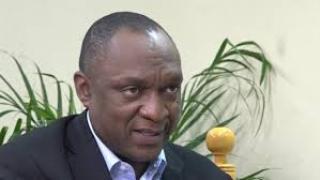Nstitutional reform process is juxtaposed against a political...
jovenelmartinebayonet2021 Says...
nstitutional reform process is juxtaposed against a political crisis that has both structural and cyclical factors.
The central crisis concerns the term limit of President Jovenel Moïse, who has been ruling by decree for over a year following the dissolution of parliament at the end of its term. President Moïse was sworn into office on 7 February 2017 after the tumultuous 2015-2016 presidential elections, and insists that his five-year term runs until 7 February 2022. The opposition contends that, according to the 1987 constitution, President Moïse's term started on 7 February 2016, when former president Michel Martelly stepped down after which an interim president took office.
It is in this context that Independent Consultative Committee responsible for drawing up the new constitution published its text.
This piece illuminates the main proposed changes in the new draft through the lens of Haitian constitutional tradition.
It reviews the impact of the proposed changes on the political regime in Haiti and the position of the diverse stakeholders.
Finally, it identifies the prospects for constitutional reform and suggests appropriate conclusions and recommendations.
Main changes in the draft constitution
The draft constitution contains many novelties and differs greatly in many areas from the 1987 constitution.
It comprises a total of 282 articles and deals with various issues relating to rights and freedoms, decentralization, certain state institutions, and the political regime.
In the preamble, the Committee maintains that the draft responds to three main concerns: the optimal mobilization of all resources; the effectiveness of state powers; and the fight against impunity.
One of the great novelties of this draft relates to citizenship and the diaspora (Art. 11).
The primordial question throughout Haitian history has been: Who is a Haitian?
And who isn't?
The 1987 constitution contained many restrictions for Haitians naturalized in foreign lands.
The draft constitution proposes to grant Haitians living abroad the right to vote in elections and run as candidates (even as deputy and mayoral candidates, if one has "habitual residence" in Haiti).
In addition, the Haitian diaspora will have the right to appoint representatives to the legislative body (not less than 5% of the total number of seats) (Art.100).
The draft constitution proposes important changes to the structure of the government.
The draft constitution proposes important changes to the structure of the government.
The new text implicitly abolishes the Senate (Art. 99), meaning Haiti would have a unicameral legislature elected every five years.
The Haitian Senate is a 215-year-old institution and has seen many upheavals throughout history.
Considered budget-consuming - the 2018-2019 legal budget allocated nearly 2% for 30 senators - inefficient, and plagued with political issues, its efficacy has been questioned by many.
The adoption of this new constitutional text implicitly would also end the position of prime minister and create instead the office of vice president, who would be elected at the same time as the president (Art. 134).
The prime minister's office, which emerged with the 1987 constitution, was a departure from Haitian political mores anchored in and accustomed to a strong presidential system.
The dual executive was often a source of political conflict, with the president suspicious of his prime minister and the latter seeing himself as a president in the making.
The establishment of a vice-presidency can be
Posted November 13 2023 at 6:27 PM
or start a NEW Topic

 VIDEO: Haiti - Senateur Youri Latortue pran gaz nan Manifestation anti Jovenel
VIDEO: Haiti - Senateur Youri Latortue pran gaz nan Manifestation anti Jovenel  VIDEO: Haiti - Men kisa pou w fè lè peyi a LOCK - Mesaj opposition an!
VIDEO: Haiti - Men kisa pou w fè lè peyi a LOCK - Mesaj opposition an!  VIDEO: Senateur Youri Latortue fenk konfime ke viza'l te koupe
VIDEO: Senateur Youri Latortue fenk konfime ke viza'l te koupe  AUDIO: King Kino fè Gwo deklarasyon sou Radio Zenith sou aktyalite politik peyi a
AUDIO: King Kino fè Gwo deklarasyon sou Radio Zenith sou aktyalite politik peyi a  AUDIO: Tande Senateur Youry Latortue nan emission Boukante Lapawol
AUDIO: Tande Senateur Youry Latortue nan emission Boukante Lapawol